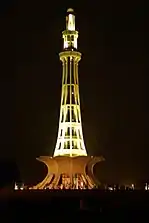Lahore remains a major tourist destination in Pakistan. The Walled City of Lahore was renovated in 2014. It is popular due to the presence of two recognized UNESCO World Heritage Sites.[1][2]
Among the most popular sights are the Lahore Fort, adjacent to the Walled City, and home to the Sheesh Mahal, the Alamgiri Gate, the Naulakha pavilion, and the Moti Masjid. The fort along with the Shalimar Gardens has been a UNESCO World Heritage Site since 1981.[3][1]
The city is home to several ancient religious sites including prominent Hindu temples, the Krishna Temple and Valmiki Mandir. The Samadhi of Ranjit Singh, also located near the Walled City, houses the funerary urns of the Sikh ruler Maharaja Ranjit Singh. The most prominent religious building is the Badshahi Mosque, constructed in 1673; it was the largest mosque in the world upon construction. Another popular sight is the Wazir Khan Mosque, known for its extensive faience tile work and constructed in 1635.[4][5][6]
Old city of Lahore is known for the grandeur of its Mughal architecture and is unique in ancient wooden balconies, temples, gurdwaras, havelis, narrow winding streets and busy bazaars.[5]
 Minar-e-Pakistan
Minar-e-Pakistan Badshahi Mosque
Badshahi Mosque Lahore Fort
Lahore Fort Lahore Museum
Lahore Museum-Welcome.JPG.webp) Lahore Zoo
Lahore Zoo
Burials
Mausolea and shrines
Buildings speak for themselves because architecture is a visual art:
- Tomb of Data Ali Hajvri
- Tomb of Hazrat Mian Mir
- Tomb of Ghazi Ilm-ud-din Shaheed
- Tomb Of Ganj e Inayat Sarkar
- Tomb of Madho Lal Hussain
- Bibi Pak Daman
- Tomb of Asif Khan
- Tomb of Jahangir
- Tomb of Muhammad Iqbal
- Tomb of Nur Jahan
- Tomb of Qutubuddin Aibak
- Tomb of Malik Ayaz
- Ahmed Ali Lahori
- Samadhi of Ranjit Singh
Cemeteries
Religious Places
Mosques
- Badshahi Mosque
- Wazir Khan Mosque
- Darbar Ganj e Inayat Sarkar
- Suneri Mosque
- Moti Masjid (Lahore)
- Grand Jamia Mosque
Temples
Churches
Gurdwaras
Galleries and museums
Havelis
There are many havelis inside the Walled City of Lahore, some in good condition while others need urgent attention. Many of these havelis are fine examples of Mughal and Sikh Architecture. Some of the havelis inside the Walled City include:
- Mubarak Begum Haveli, Bhati Gate, Lahore
- Chuna Mandi Havelis
- Haveli of Nau Nihal Singh
- Nisar Haveli
- Haveli Barood Khana
- Salman Sirhindi ki Haveli
- Dina Nath Ki Haveli
- Mubarak Haveli – Chowk Nawab Sahib, Mochi Gate/Akbari Gate
- Lal Haveli beside Mochi Bagh
- Mughal Haveli (residence of Maharaja Ranjeet Singh)
- Haveli Sir Wajid Ali Shah (near Nisar Haveli)
- Haveli Mian Khan (Rang Mahal)
- Haveli Shergharian (near Lal Khou)
Hospitals
Libraries
Markets
- Liberty Market
- Ali Da Malang (Lahore) or Naveed Nagar
- Fortress Stadium (Lahore)
- Abid Market
- Moon Market, Lahore
- Kareem Market
- Barkat Market garden Town Lahore
- Anarkali bazaar
Bazars
Old Lahore is a hub of commercial activity:[5]
- Anarkali Bazaar
- Gawalmandi
- M. M. Alam road
- Pak Tea House
- The Mall
- Ramghar Bazar
- Shalimar Bazar
- Baghbanpura Bazar
- Dharampura Bazar Lahore
- Sadar Bazar, Lahore
- Ichhra Bazar
- Main Bazar Chungi Ammar Sidhu
- Qanchi Bazar Qanchi
Trade centers
- Ali Trade Center
- Mall Of Defence
- Hafeez Trade Center
- Lahore Stock Exchange
- Siddique Trade Center
- Hall Road
- Vogue Towers
- Haji Plaza
Monuments
Sports venues
See also
References
- 1 2 3 Yasmin Elahi (31 May 2015). "Heritage Sites in Pakistan". Dawn (newspaper). Retrieved 27 January 2018.
- ↑ Reporter, The Newspaper's Staff (2 January 2016). "Ten-fold increase in foreign tourists for Lahore Walled City". Dawn (newspaper). Retrieved 27 January 2018.
- ↑ Mahnoor Shahid (3 January 2015). "Historical mosques of Lahore". Pakistan Today (newspaper). Retrieved 27 January 2018.
- ↑ Blanshard Asher, Catherine (1992). Architecture of Mughal India. Cambridge University Press. ISBN 978-0-521-26728-1.
- 1 2 3 Zareen Muzaffar (8 February 2016). "The Walled City of Lahore: Protecting Heritage and History". The Diplomat (magazine). Retrieved 27 January 2018.
- ↑ "Wazir Khan Mosque". Visit Lahore. Retrieved 2020-11-14.